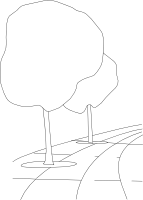Associations to the word «Path»
Noun
- Rustling
- Tree
- Pali
- Climb
- Headland
- Illumination
- Slope
- Computation
- Coherence
- Impediment
- Hike
- Stumble
- Summit
- Grass
- Maha
- Parkland
- Formulation
- Driveway
- Realization
- Amplitude
- Edge
- Pursuing
- Waterfall
- Turning
- Road
- Impedance
- Thorn
- Jungle
- Reflector
- Terrace
- Asphalt
- Kilometre
- Easterly
- Scatter
- Upward
- Cairn
- Conduction
- Grotto
- Dependence
- Buddhism
- Torrent
- Bandwidth
- Terrain
- Diagram
- Pathway
- Tcp
- Thames
- Turnpike
- Yew
- Scattering
- Escarpment
Adjective
Pictures for the word «Path»
Wiktionary
PATH, noun. A trail for the use of, or worn by, pedestrians.
PATH, noun. A course taken.
PATH, noun. (paganism) A Pagan tradition, for example witchcraft, Wicca, druidism, Heathenry.
PATH, noun. A metaphorical course.
PATH, noun. A method or direction of proceeding.
PATH, noun. (computing) A human-readable specification for a location within a hierarchical or tree-like structure, such as a file system or as part of a URL
PATH, noun. (graph theory) A sequence of vertices from one vertex to another using the arcs (edges). A path does not visit the same vertex more than once (unless it is a closed path, where only the first and the last vertex are the same).
PATH, noun. (topology) A continuous map \(f\) from the unit interval \(I = [0,1]\) to a topological space \(X\).
PATH, verb. (transitive) To make a path in, or on (something), or for (someone).
PATH DEPENDENCE, noun. (countable) A situation in which the outcome varies with the route taken.
PATH DEPENDENCE, noun. (uncountable) (economics) The theory that a technological option selected by the market need not be the technologically best one, because of the traction obtained by an early-introduced, technologically inferior alternative option.
PATH DEPENDENCY, noun. Alternative form of path dependence
PATH INTEGRAL FORMALISM, noun. A formalism for a physical theory which is based upon Feynman path integrals.
PATH LENGTH, noun. (graph theory) The number of edges traversed in a given path in a graph.
PATH LENGTH, noun. (physics) The distance travelled by light in a specified context.
Dictionary definition
PATH, noun. A course of conduct; "the path of virtue"; "we went our separate ways"; "our paths in life led us apart"; "genius usually follows a revolutionary path".
PATH, noun. A way especially designed for a particular use.
PATH, noun. An established line of travel or access.
PATH, noun. A line or route along which something travels or moves; "the hurricane demolished houses in its path"; "the track of an animal"; "the course of the river".
Wise words
Abuse of words has been the great instrument of sophistry
and chicanery, of party, faction, and division of society.

